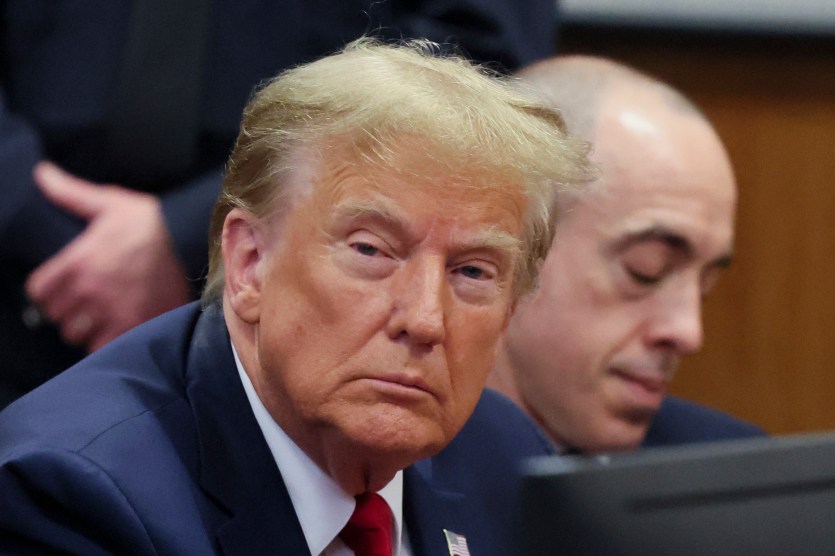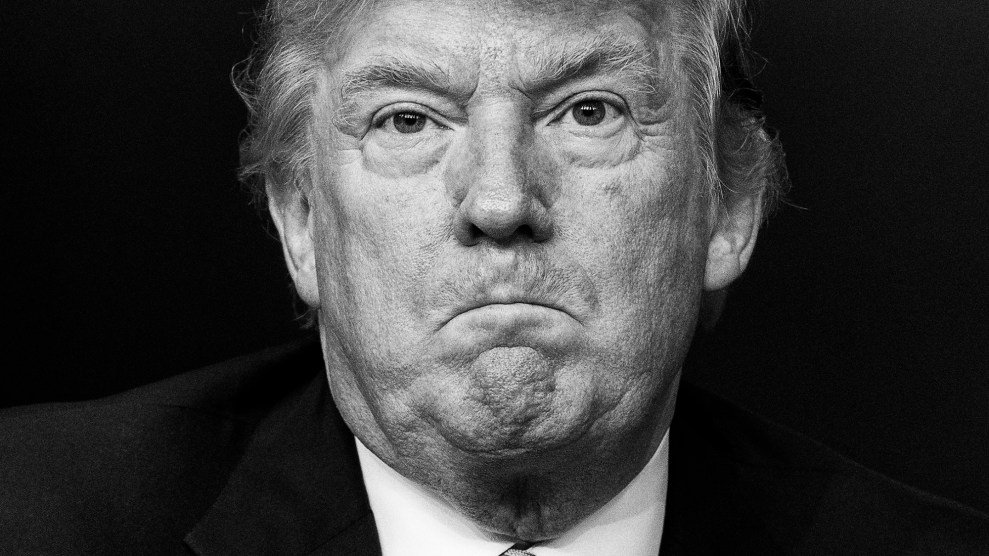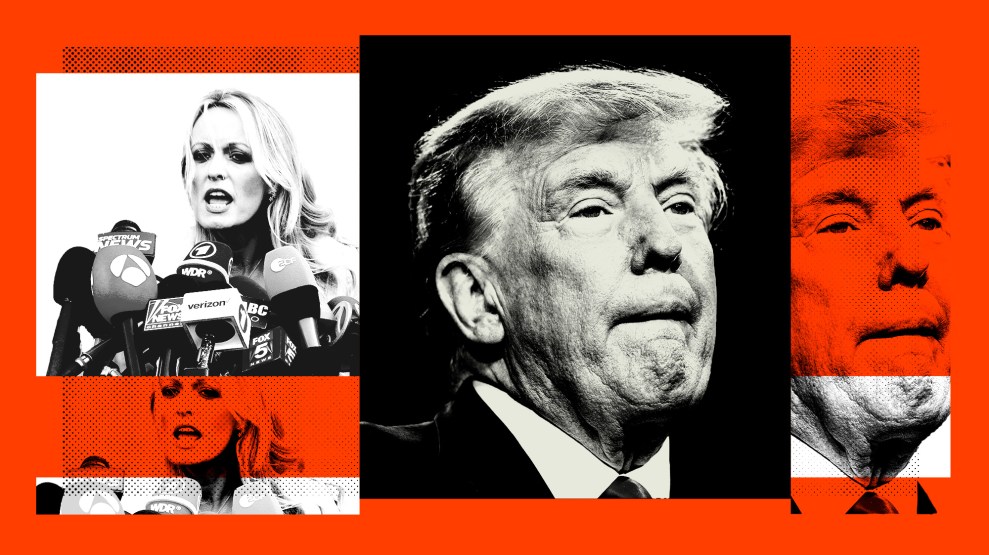
Donald Trump appears at a Manhattan criminal court on February 15, 2024, for a hearing in his porn-star/hush-money case. Brendan McDermid/AP
Editor’s note: The below article first appeared in David Corn’s newsletter, Our Land. The newsletter comes out twice a week (most of the time) and provides behind-the-scenes stories and articles about politics, media, and culture. Subscribing costs just $5 a month—but you can sign up for a free 30-day trial of Our Land here.
Since the beginning of Donald Trump’s indictment-o-rama, the politerati have considered the criminal case filed in New York City against the former president by District Attorney Alvin Bragg to be a sideshow. Though this case has key elements of a bona fide scandal—porn star! hush money! alleged extramarital affair!—pundits and politicos have struck a dismissive attitude toward Trump’s Stormy Daniels mess and the legal peril it poses him. Perhaps because it’s not as weighty a matter as swiping top-secret documents or attempting to overturn an election by subverting the constitutional order of the republic. Also perhaps because this caper involves the less-sexy charge of falsifying business records to hide a possible violation of election law. Bor-ing, right?
Yet on Thursday, a New York City judge kicked aside a Trump motion to cancel the prosecution and set a trial date for March 25. Presuming there are no postponements in this case, this means the first criminal trial of a former president will focus on Trump’s effort to pay off an adult movie actor in the weeks before the 2016 election. Up to now, the presumption was that special counsel Jack Smith’s election interference case against Trump would come before a jury first, with Smith’s stolen-documents case, the Georgia RICO case, and the Bragg case lagging behind. But Trump has successfully delayed the two Smith trials with assorted motions and maneuvers, and the Georgia case has hit its own snag, as District Attorney Fani Willis has had to defend herself against the allegation that her romantic relationship with a fellow prosecutor working on the case somehow amounts to a conflict of interest.
It might be fitting that the sleaziest case will go first. But this prosecution ought not to be diminished. It also involves alleged criminal actions taken to influence an election—or prevent an election from being influenced by Daniels’ claim that Trump had a tryst with her at a 2006 charity golf tournament in Lake Tahoe while his wife, Melania, was home with 4-month-old Barron. And here’s an important fact: The Justice Department and a federal court have already declared that a crime occurred in the commission of this $130,000 payoff.
Those of you who might need a refresher course in the Trump-Daniels Affair are fortunate. About a year ago, I published a comprehensive rundown of this nasty business based on court records and public accounts. If you believe possessing a thorough knowledge of all this will impress your friends, you should read this article. But for our purposes now, you only need to recall this: Trump’s former fixer Michael Cohen pleaded guilty to arranging the bribe paid to Daniels, and he was sent to the hoosegow for that and other infractions of the law. That is, a crime did happen. The question now is whether Trump will be held accountable for it.
It’s tough to keep track of all of Trump’s legal woes. But you might remember that when the feds were prosecuting Cohen, they referred to Trump as “Individual-1” in their court filings. In the sentencing memo that the US attorney’s office filed in December 2018 after Cohen pleaded guilty to making an illegal campaign contribution with the Daniels payment and to other unrelated charges, the prosecutors stated that regarding that payoff to Daniels, Cohen “acted in coordination with and at the direction of Individual-1.”
Trump’s Justice Department said the hush-money payment was a federal crime, and its prosecutors declared in an official proceeding that Trump had been a co-conspirator and caused this crime to be committed. Yet nothing happened to Trump. Cohen was shipped off to federal prison in upstate New York to serve two and a half years.
This episode raised the question of high-level corruption. Following the resolution of Cohen’s case, federal prosecutors in the Southern District of New York intended to continue investigating the matter, which could have included further probing Trump’s role. But in his book, Holding the Line, Geoffrey Berman, who served as the US attorney for the Southern District, revealed that Bill Barr, who became attorney general around this time, tried to kill “the ongoing investigation”—and that Barr in a “highly unusual” move suggested that Cohen’s conviction be reversed. Berman wondered if Barr’s goal was “to ensure that the president could not be charged after leaving office.”
It was classic: The boss got off; the lieutenant did the time. Bragg seeks to remedy this unfairness. Legal experts will tell you that the case—with its 34 felony counts of falsifying business records to hide the $130,000 payment—is not a slam dunk. But it is important. As Norm Eisen, a former Obama White House counsel, puts it, “It is really an election interference case—the gateway drug to what later developed with election interference in 2020.” And in the aftermath of Trump’s $83 million loss in the sexual assault and defamation civil case brought against him by E. Jean Carroll, a trial that showcases Trump’s alleged infidelity could reinforce negative attitudes about his personal conduct.
And there’s more: This is a state prosecution, not a federal affair. Should Trump be convicted in this case, he could not pardon himself if he were to return to the White House. Nor could he order this case shut down were it to last that long due to appeals. One wonders what might happen if Trump is sentenced to prison and he wins the election. Will he defy the New York legal system? Will marshals from the Empire State seek to haul him in and find themselves in a standoff with Secret Service agents? As bizarre as the Trump years have been, they can become wilder.
While it made sense for Smith to go first with a trial related to Trump’s effort to end American democracy, that’s not what’s in the script now. The hush-money case, which forces Americans to once more confront Trump’s scuzziness, ought not to be scoffed at. It reveals so much about the man: his phoniness, his personal dishonesty, his hypocrisy, his corruption. Of his many alleged crimes, it may not be the greatest. But it may be the Trumpiest.
David Corn’s American Psychosis: A Historical Investigation of How the Republican Party Went Crazy, a New York Times bestseller, has been released in a new and expanded paperback edition.
















